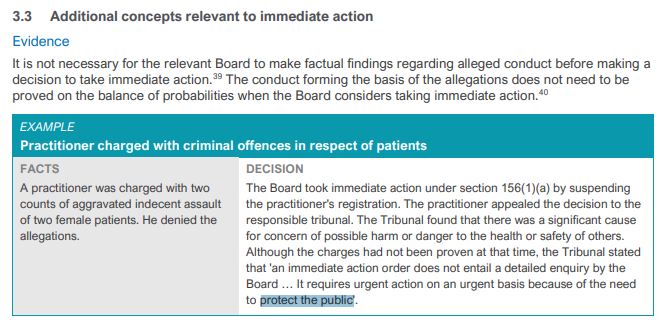Well, um,
Andrew Churchyard took his own life in 2016
so that’s lower risk for the ABC.
These stories are very rarely even-handed, always looking for the shock-horror angle, sensationalist, embellishment, conflation, … There are some things to argue against in that article but some things of course that are indefensible.
I would make the observation: Imagine that it’s you that has (allegedly) done the wrong thing. What would be your expectations around how a complaint is dealt with and whether the response is proportionate?
In that respect, I see nothing wrong with
More than 160 are still allowed to work today.
That’s proportionate response in operation. Would you think that a single speeding ticket should be enough to get you banned from driving for life? You can kill someone through dangerous driving and by default you won’t be disqualified for life (in NSW). (However there is no maximum disqualification period so it is open to the court to ban you for life, again, in NSW.)
In that respect I disagree with the opening proposition
You would expect that if a doctor, nurse or psychologist had been found to have […], they would no longer be allowed to practise.
No, I wouldn’t expect that! I would expect calm, impartial consideration of the facts and a proportionate response.
I think that, for balance, attention should be drawn to the following quote:
"Because we invest so much in training our doctors … if they can be rehabilitated and returned to safe practise, that’s usually seen as a good thing,” she says.
Isn’t that what we (in almost all cases) expect for everyone who has been found to have done the wrong thing? We don’t generally lock them up and throw away the key.
I think the following from the article is also contentious
had sex with a patient
We are talking here about consenting adults. (I assume this because if we were not then the ABC would be all over it like a rash.) Apparently in one case this doctor accepted sex in lieu of payment. Controversial? Undoubtedly. Cut and dried? No.
I just wonder what Medicare made of the claim in that case. 
In the other two cases involving this doctor, no information is provided at all about the context in which this doctor had sex with a patient. With no information, one can’t really form an opinion (but this is the internet so…).

